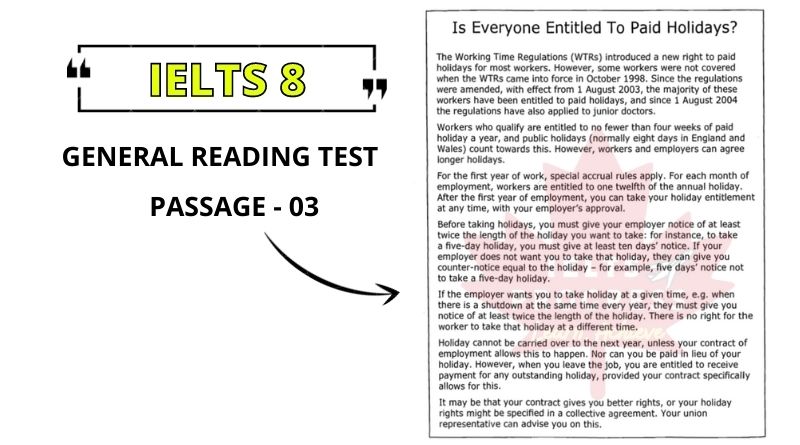IELTS General Test – Passage 03: Is Everyone Entitled to Paid Holidays? reading with answers explanation, location and pdf summary. This reading paragraph has been taken from our huge collection of Academic & General Training (GT) Reading practice test PDF’s.

IELTS reading module focuses on evaluating a candidate’s comprehension skills and ability to understand English. This is done by testing the reading proficiency through questions based on different structures and paragraphs (500-950 words each). There are 40 questions in total and hence it becomes extremely important to practice each and every question structure before actually sitting for the exam.
This reading passage mainly consists of following types of questions:
- Write the correct answers
We are going to read about the frequently asked questions about paid holidays. You must read the passage carefully and try to answer all questions correctly.
Is Everyone Entitled to Paid Holidays?
The Working Time Regulations (WTRs) introduced a new right to paid holidays for most workers. However, some workers were not covered when the WTRs came into force in October 1998. Since the regulations were amended, with effect from 1 August 2003, the majority of these workers have been entitled to paid holidays, and since 1 August 2004, the regulations have also applied to junior doctors.
Workers who qualify are entitled to no fewer than four weeks of paid holiday a year, and public holidays (normally eight days in England and Wales) count towards this. However, workers and employers can agree longer holidays.
For the first year of work, special accrual rules apply. For each month of employment, workers are entitled to one-twelfth of the annual holiday. After the first year of employment, you can take your holiday entitlement at any time, with your employer’s approval.
Before taking holidays, you must give your employer notice of at least twice the length of the holiday you want to take: for instance, to take a five-day holiday, you must give at least ten days’ notice. If your employer does not want you to take that holiday, they can give you counter-notice equal to the holiday – for example, five days’ notice not to take a five-day holiday.
If the employer wants you to take holiday at a given time, e.g. when there is a shutdown at the same time every year,’ they must give you notice of at least twice the length of the holiday. There is no right for the worker to take that holiday at a different time.
Holiday cannot be carried over to the next year, unless your contract of employment allows this to happen. Nor can you be paid in lieu of your holiday. However, when you leave the job, you are entitled to receive payment for any outstanding holiday, provided your contract specifically allows for this.
It may be that your contract gives you better rights, or your holiday rights might be specified in a collective agreement. Your union representative can advise you on this.
________________
ALSO TRY:
1) IELTS 8 READING PASSAGE – KENICHI SOFTWARE ↗
2) IELTS 8 READING PASSAGE – HOLIDAY PLUS ↗
3) IELTS 8 READING PASSAGE – SYDNEY TRAVEL COLLEGE ↗
________________
Questions 21–27
Answer the questions below.
Choose NO MORE THAN THREE WORDS AND/OR A NUMBER from the text for each answer.
Write your answers in boxes 21-27 on your answer sheet.
21. In what year were the regulations extended to cover most of the workers who were originally excluded?
22. What is the minimum annual paid holiday which workers are entitled to?
23. During a worker’s first year of employment, what proportion of their annual holiday does a month’s work give?
24. What can an employer give a worker to stop them taking holiday that they have requested?
25. What is given as a possible reason for an employee having to take a holiday at a certain time?
26. When an employee leaves their job, what should be given in place of any holiday they have not taken?
27. Apart from a contract, what type of document may set out an employee’s holiday rights?
Answers
Check out Is Everyone Entitled to Paid Holidays? reading answers below with explanations and locations given in the text.
21. (in) 2003
22. 4 weeks (a year)
23. one twelfth// one-twelfth (of annual holiday(s))
24. (equal) counter-notice
25. (the) (annual) shutdown // (a) shutdown
26. (a) (holiday) payment/ outstanding holiday payment
27. (a) collective agreement
Have any doubts??? Discuss in the comments ...
If you want the pdf summary of Is Everyone Entitled to Paid Holidays? reading passage and answers, please write your email in the comment section below. We’ll send it across at the speed of light.

ALL THE BEST !